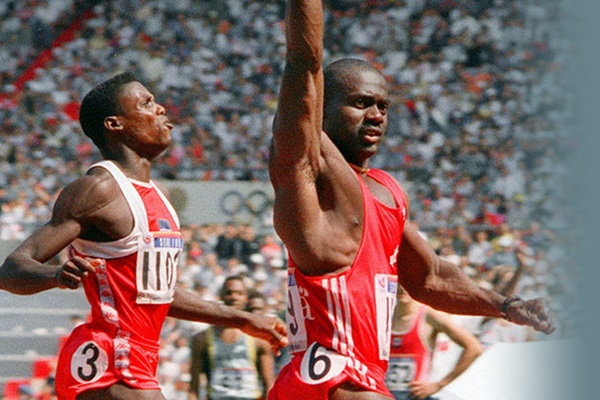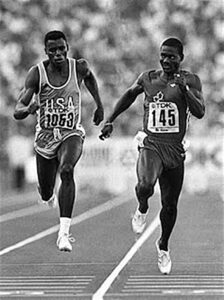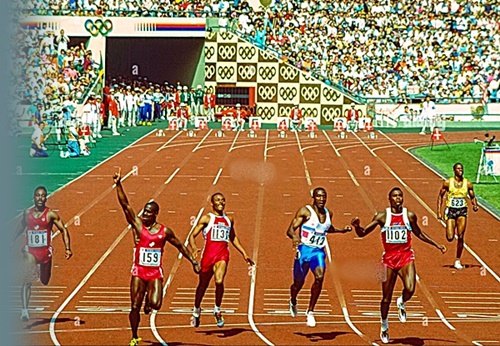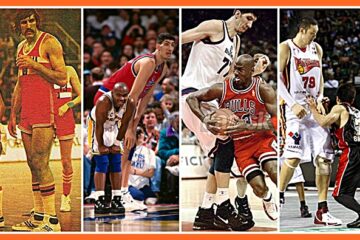The dirtiest race in the history! | 1988 Seoul, Lewis vs Johnson!

1988, Seoul
The dirtiest race in the history!
Ben Johnson was born in Falmouth, Jamaica, on December 30, 1961. Small and shy, he began to stutter at the age of 12 as a result of constantly mimicking his older brother’s stammer. When he was 14 he moved to Toronto with his mother and three of his five siblings. Like his future rival, Carl Lewis, Johnson experienced a rapid growth spurt when he was 15 years old. It was also at this time that Johnson came under the tutelage of sprint coach Charlie Francis, the man who would guide his running career for the next 11 years.

On August 29, 1980, Johnson took part in the Pan American Junior Championships in Sudbury, Ontario, finishing sixth with a time of 10.86. This seemingly unimportant race would, in retrospect, earn significance as the first encounter between Johnson and Lewis, who won the contest in 10.43. Johnson scored his first major international success two years later when he finished second at the 1982 Commonwealth Games. Two years after that he qualified for the 100-meter final at the Los Angeles Olympics. After purposely false starting in an unsuccessful attempt to rattle Lewis, Johnson surprised track fans by earning the bronze medal behind Lewis and Sam Graddy.
In 1985, after seven consecutive losses, Johnson finally defeated Lewis. By 1986 there was no question that “Big Ben” had wrested the title of Fastest Man on Earth from ‘King Carl.” By the time of their classic confrontation at the 1987 world championships in Rome, it was Johnson who had won their last four encounters. By that time, also, Johnson had developed a reputation as an incredibly fast starter who appeared to leap out of the blocks like a panther going after a kill or a guard dog attacking an intruder. In the Rome final he burst off the line with so much power that he almost fell over. After ten meters he was already in front by a full meter, a lead he would hold all the way to the finish line, which he reached in a mere 9.83 seconds, breaking the world record by a full tenth of a second. In less than ten seconds Ben Johnson had become an international celebrity. He would soon sign commercial endorsement contracts worth millions of dollars.

Meanwhile, Carl Lewis, who had equaled the world record of 9.93 only to finish second, was livid. Although e refused to name names, he made it clear that he thought Johnson was taking illegal, performance-enhancing drugs. Although many dismissed Lewis’ charges as sour grapes, he was not alone in his suspicions. On the track circuit, Johnson’s highly sculptured muscles and yellow-tinged eyes, two indications of steroid use, had earned Johnson the nickname “Benoid.” However, as his coach, Charlie Francis, was quick to point out, Johnson had passed innumerable drug tests. In 1985 Johnson himself told Canada’s Athletics magazine, “Drugs are both demeaning and despicable and when people are caught they should be thrown out of the sport for good.
I want to be the best on my own natural ability and no drugs will pass into my body.” As 1988 began, Johnson seemed to have a lock on the Olympic gold medal. But then disaster struck. In February, he pulled a hamstring muscle. In May, he re injured his leg. In June, he broke away from Charlie Francis for the first time. However, a few weeks later they reconciled and Johnson returned to competition in time to win the Canadian Olympic trials.

On August 17 in Zurich, the site of Johnson’s first victory over Lewis three years earlier, the two met again for the first time since the Rome world championships. As usual, Johnson broke in front, but this time Lewis mowed him down to win with a time of 9.93 seconds. Calvin Smith was second at 9.97 and Johnson third at 10.00.
Five days later in Cologne, Johnson was again beaten into third place, this time by Smith and Dennis Mitchell. While Johnson retreated to Canada for a final month of training, Lewis was installed as the overwhelming favorite to become the first male sprinter to retain his Olympic title. Johnson dismissed this growing consensus.“When the gun go off,” he said, “the race be over.”
In Seoul, Lewis appeared to be in perfect form. He registered the fastest time in each of the first two rounds: 10.14 and 9.99. Johnson, meanwhile, caused a minor sensation in the second round. The rules stated that the top two finishers in each of the six heats would advance to the semifinals, as would the four fastest of the remaining runners. Johnson, misjudging the size of his lead, eased up long before the end, and dropped to third behind Linford Christie and Dennis Mitchell.
Fortunately, Johnson’s 10.17 allowed him to advance anyway. The semifinals were held the following day, Saturday, at noon. Lewis won the first heat in 9.97. In the second, Johnson was called for a false start, a runng that infuriated him. Still, he managed to control his anger and win the race in 10.03 despite running into a 1.2-meters-per-second head wind. Less than an hour and a half later, the eight finalists met at the starting line. Carl Lewis was in lane 3, Ben Johnson in lane 6. They were separated by Linford Christie and Calvin Smith. By now Johnson’s muscles were so highly developed that, as he waited for the sound of the starter’s pistol, they seemed to be separate beings on the verge of exploding out of his skin.
As expected, Johnson charged into the lead immediately. On May 5, 1987, Carl Lewis’ father had died of cancer. At the funeral, Carl had reached into his pocket and pulled out the gold medal he had earned for winning the 100 meters in 1984. He placed the medal in his father’s hands and said, “I want you to have this because it was your favorite event.” Noting his mother’s surprise, he added, “Don’t worry, I’ 11 get another one.”
Now, halfway through the 1988 final, he glanced to his right, saw Ben Johnson five feet ahead of him, and was convinced that he could catch him. At the 80-meter mark Lewis looked over again and discovered that he was still five feet behind. This time he knew the race was lost. “Damn,” he thought. “Ben did it again. The bastard got away with it again.

It’s over, Dad.” Just before the finish line, Johnson stared back at Lewis and thrust his right arm into the air, his index ranger pointed to the sky. His time was an amazing 9.79. Lewis, convinced that Johnson was on steroids, wanted to protest, but held his tongue. As he later wrote in his autobiography, inside Track, “I didn’t have the medal to replace the one I had given [my father], and that hurt. But I could still give something to my father by acting the way he had always me to act, with class and dignity.” He shook Johnson’s hand and walked away, ignoring the taunts of a group of Canadian fans who chanted, “When the gun go off, the race be over”.
Johnson accepted the accolades of the crowd, appeared live on Canadian television, and then went off to doping control where he required one and a half hours and several beers to produce a urine sample. Afterward he spent over an hour in a sauna, then celebrated by eating half of a cream cake given to him by his mother, dining with friends at an Italian restaurant, and visiting a disco.
Back in Canada, the population was in ecstasy. In the 12 Olympics prior to the boycotted Games of 1980 and 1984, Canada had averaged one gold medal per Olympics. Its last track-and-field gold had come in 1932. The headline in the Toronto Star summed up the mood of the nation:
“Ben Johnson—a national treasure. Meanwhile, Johnson’s urine sample was delivered to the Olympic Doping Control Center, numbered, and divided into two parts labeled “A” and “B.” On Sunday, the testing center, not knowing whose urine they were examining, discovered that the “A” sample contained steroids.
This information was passed on to Prince Alexandre de Merode of Belgium, the chairman of the I.O.C.’s medical commission. He matched the sample to a list of athletes’ numbers and became the first person to learn that the guilty party was Ben Johnson. De Merode wrote a letter to the Canadian team, which was delivered at 1:45 a.m., Monday.
At 7:00 a.m., Carol Anne Letheren, the Canadian chef de mission, informed Johnson of the positive test. Three hours later, with Canadian representatives in attendance, the “B” sample was tested and it too registered positive. At 3:30 Tuesday morning, Letheren revisited Johnson to collect his gold medal. “We love you,” she told him, “but you’re guilty.”
At 10:00 a.m., the I.O.C. called a press conference and issued the following statement: ‘be urine sample of Ben Johnson (Canada—Athletics—100 meters) collected on Saturday, 24th September 1988 was found to contain the metabolites of a banned substance namely stanozolol (ana- bolic steroid). ..
The I.O.C. Medical Commission recommends the following sanction: disqualification of this competitor from the Games of the XXIV Olympiad in Seoul. Of course, the gold medal has been withdrawn by the I.O.C Although Johnson was the 43rd Olympic athlete to be dis- qualified because of drugs since testing began in 1968, he was the first “big fish” to be caught.

His disgrace was front-page news all over the world. Initially, Johnson denied having taken steroids. Charlie Francis claimed that Johnson was a victim of sabotage, that he had been given a spiked drink. Francis even hinted that agents of Carl Lewis had been responsible. The Canadian government, to its great credit, wasted no time in ordering an investigation into the use of banned substances by Canadian athletes, including several of John- son’s sprinting teammates and a number of weightlifters who tested positive before the Games and were not allowed to travel to Seoul.
The investigation, much of which was televised live, became known as the Dubin Inquiry in honor of the man in charge of the hearings, Charles Dubin, an associate chief justice of the Ontario Supreme Court. Testifying before the Dubin Commission, Charlie Francis and Johnson’s doctor, George (Jamie) Astaphan, revealed that the sprinter began taking steroids in November 1981 because Francis convinced him that everyone else was taking them and that if he didn’t, he would be left behind.
Over the next seven years, Johnson took the anabolic steroids Dianabol, stanozolol, and furazabol, as well as testosterone, diuretics, which he used as masking agents, and human growth hormone, which was made from human cadavers. Although Astaphan had once labeled a bottle of steroids “Do Not Take Within 28 Days of Competition,” he apparently gave Johnson an injection only 26 days before the Olympic final. The Dubin Commission concluded that this injection contained Winstrol – V, a stanozolol compound used to fatten cattle before they are sent to market.
On June 12, 1989, Johnson himself appeared before the Dubin Commission. He admitted taking steroids and lying to the public when he said he hadn’t. The following day, he was asked if he had any message for young athletes who had considered him their idol. With tears in his eyes, he replied, “I want to tell them to be honest and don’t take drugs. It happened to me. I’ ve been there. I know what it’s like to cheat.”
Three months later, the I.A.A.F., in a controversial decision, retroactively rescinded Johnson’s 1987 world record even though he had passed the drug test in Rome. Johnson served out his standard two-year suspension and returned to competition in 1991. However, his times were not what they had been in his drug-augmented heyday. Johnson qualified for the 1992 Canadian Olympic team but was eliminated in the semifinals at the Olympics.
Following a meet in Montreal on January 17, 1993, Johnson again tested positive for drugs—this time excessive levels of the male hormone testosterone—and he was banned for life.

Although he had passed similar tests two days before and four days after the Montreal meet, Johnson chose not to appeal the ban. The 1988 ,hold medal, which Johnson lost, did go to Carl Lewis after all, raising Lewis’ career total to six golds and one silver.
Source: The Complete Book of the Summer Olympic Games / The Overlock Press Woodstock & New York 2000 edition / D. Wallechinsky / p. 13-15
____________________
Sports Vision+ / Champions Hour in activity since 2013
Photos are courtesy of Google. If you have any issue on photos, please let us know before you are taking any actions. Thank You!
Discover more from Sports Vision +
Subscribe to get the latest posts sent to your email.













